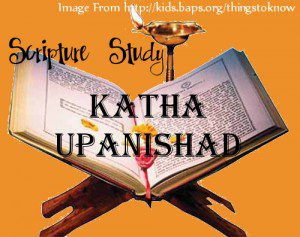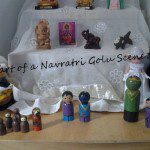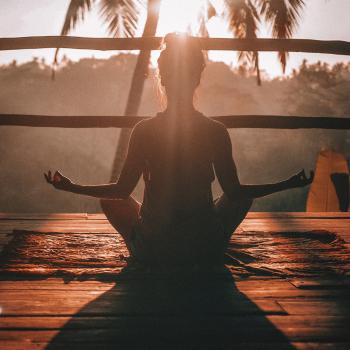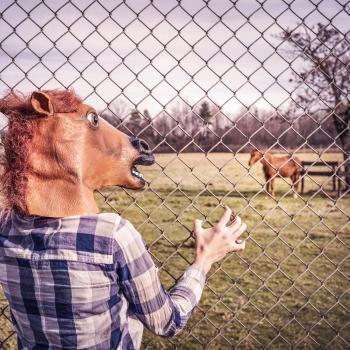We are doing a scripture study together: reading along through some scriptures and discussing the passages. We are reading one of my favorite upanishads: The Katha. This is the story of a boy who chatted with the God of death.
http://www.angelfire.com/electronic/awakening101/upani_katha.html
Chapter II
1
There is a city with eleven gates belonging to the unborn Atman of undistorted Consciousness. He who meditates on Him grieves no more; liberated from the bonds of ignorance, he becomes free. This, verily, is That.
2
He is the sun dwelling in the bright heavens. He is the air in the interspace. He is the fire dwelling on earth. He is the guest dwelling in the house. He dwells in men, in the gods, in truth, in the sky. He is born in the water, on earth, in the sacrifice, on the mountains. He is the True and the Great.
3
He it is who sends prana upward and who leads apana downward. All the devas worship that adorable One seated in the middle.
4
When the soul, identified with the body and dwelling in it, is torn away from the body, is freed from it, what then remains? This, verily, is That?
5
No mortal ever lives by prana, which goes up, nor by apana, which goes down. Men live by something different, on which these two depend.
6
Well then, Gautama, I shall tell you about this profound and eternal Brahman and also about what happens to the atman after meeting death.
7
Some jivas enter the womb to be embodied as organic beings and some go into non—organic matter—according to their work and according to their knowledge.
http://www.vedarahasya.net/katha-5.htm Chapter-V
By meditating on that one (the Atma) who is immortal and whose mind is without a blemish and who resides in this city of eleven gates (the philosophical comparison of the human body with eleven pores in different places), one gets relieved from all sorrows. He attains the characteristics of a wise man and gets relieved from the bonds of birth and death. This is that state which we are contemplating about.
He is the sun traveling in the pure, clear sky; He is the air filling up the entire space of the universe; He is the fire in the places where yagna (a hindu rite) is performed; He is the guest at people’s houses; He is in men; He is in the best Devas; He is in truth; He is in the sky; He is the one seen in various forms in the water, earth, yagna and in the mountains (in the form of rivers) etc., He is the one present everywhere and He is the great one who is above all.
He moves the praana (the inward life-breath) upwards; He brings down the apaana (another force of breath – the outward one– refer the Prsna Upanishad translation for more). He, in the small form, who is seated at the center of the body, is worshipped by all Devas (the Gods and Goddesses).
If this Atma residing in the body leaves this body and goes out, what is it that will remain? That without which the life and body will be inactive is that thing that we are contemplating about.
No man exists just because of (the movement of) praana, the inward breath and apaana, the outward breath. He exists on that thing (the Atma) which is the source of these forms of breath.
O Gautama! Concentrate on this intently! I shall now tell you again about this Brahman, which is very ancient and secretive.
I shall also tell you about the state of and whereabouts of the Jiva after death (when it has not learnt about the Brahman).
Commentary (Swami Krishnananda)
In this chapter, the Upanishad proceeds to explain the stages of self-control and the recognition of the Atman in one’s day-to-day life.
…How are we to perform self-control, atmavinigraha? It is nothing but a remembrance of the various functions taking place in our body, instead of forgetting them on account of a tremendous attraction to objects outside. We seem to forget ourselves. We are wise about others, but not about ourselves. We have to be wise in regard to ourselves, instead of being wise about others.
…Do not be a slave of this traffic; to be a witness to it, performing anushthana in this very birth, consciousness should visualise itself as the supreme Lifegiver of all things, for without it, they would disintegrate. When it combines itself with the elements, it becomes a jiva, and when it separates itself from them, it becomes liberation: the freed ones get free.
…“A city of eleven gates belongs to the uncrooked intelligence. By ruling it, one does not grieve.” This body has eleven gates. What are the eleven gates of this body-city? Some say the eleven orifices in the bodily system are the two eyes, two nostrils, two ears, mouth, the two of evacuation, navel and the crown of the head. But these are gates of only the gross body. There are also eleven gates in the subtle body, the eleven senses: five jnanendriyas, five karmendriyas, and the mind. So this city of the human personality is endowed with eleven openings, and consciousness can rush out through any of these. It can rush forth if there is even one gate; what to say if there are eleven! It splits up and moves. But this light within is not elevenfold. It is single, and it is not channelised, just as the space in a vessel is not limited to its walls. If a violent wind blows, it is not blown out. His light is always straight, and it is never extinguished. Our body is perpetually illumined by this light within. It does not bend with the body or get destroyed when the latter disintegrates. It does not get affected with the affections of the body. Nothing on earth or in heaven can affect light. This light is avikara aja. One cannot restrict it as one can the things of the world. Though it illumines the eleven gates and also the things outside them, it is unaffected by what happens in the body and around it.















